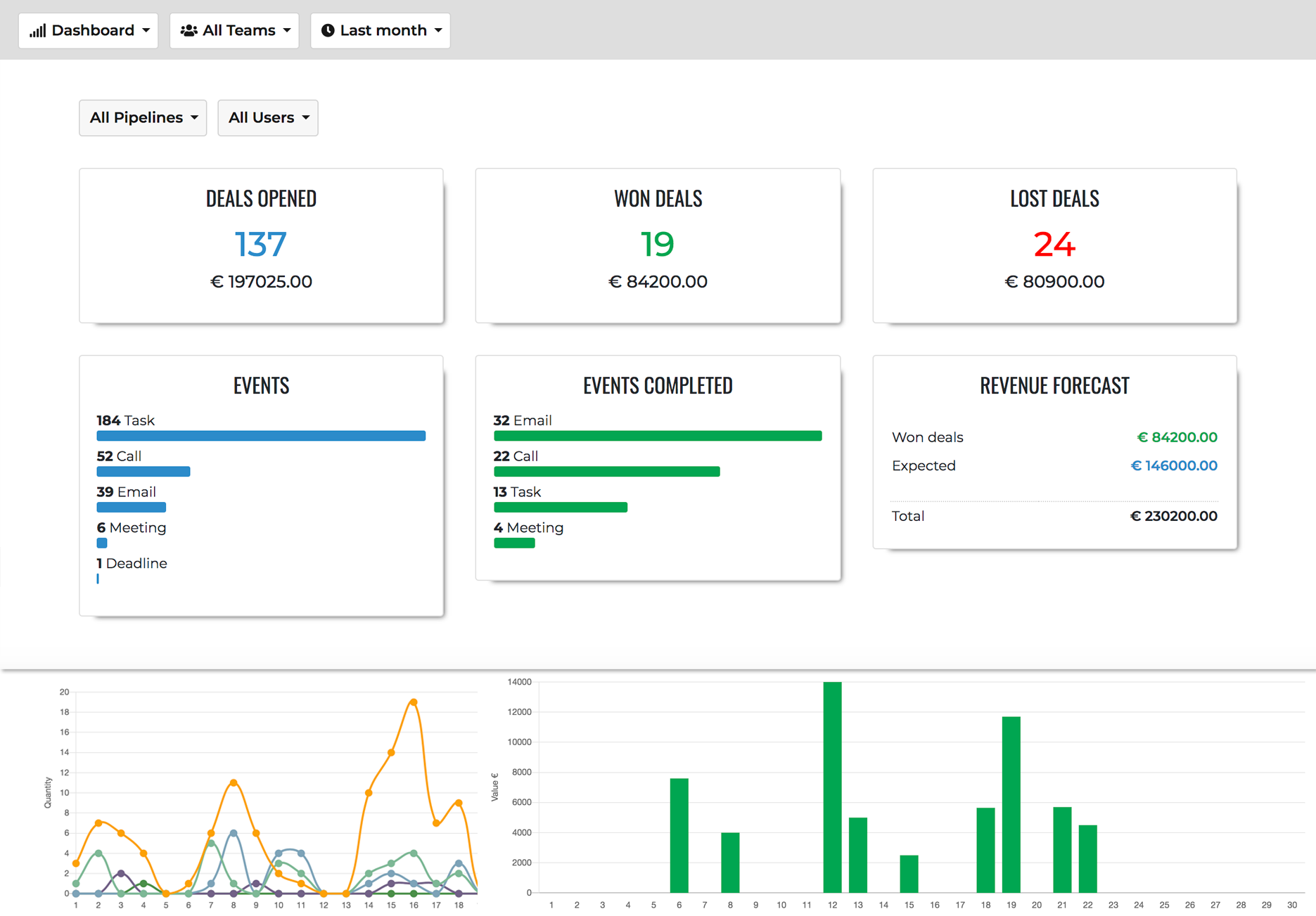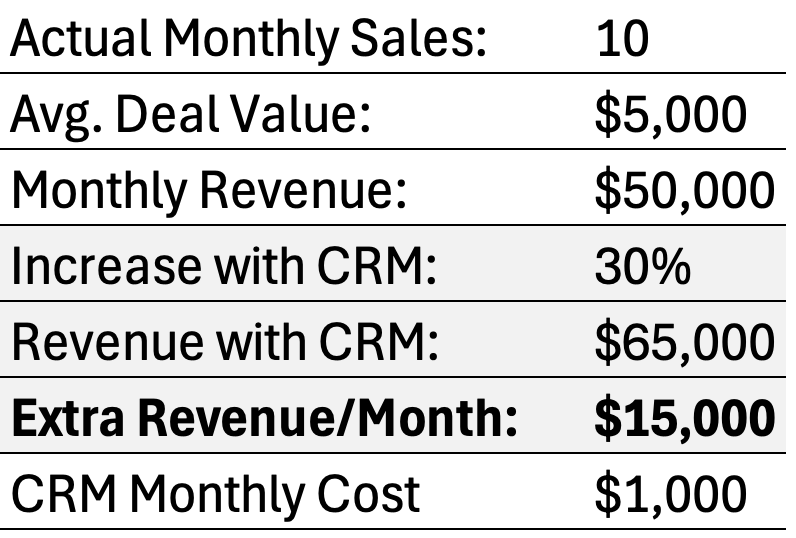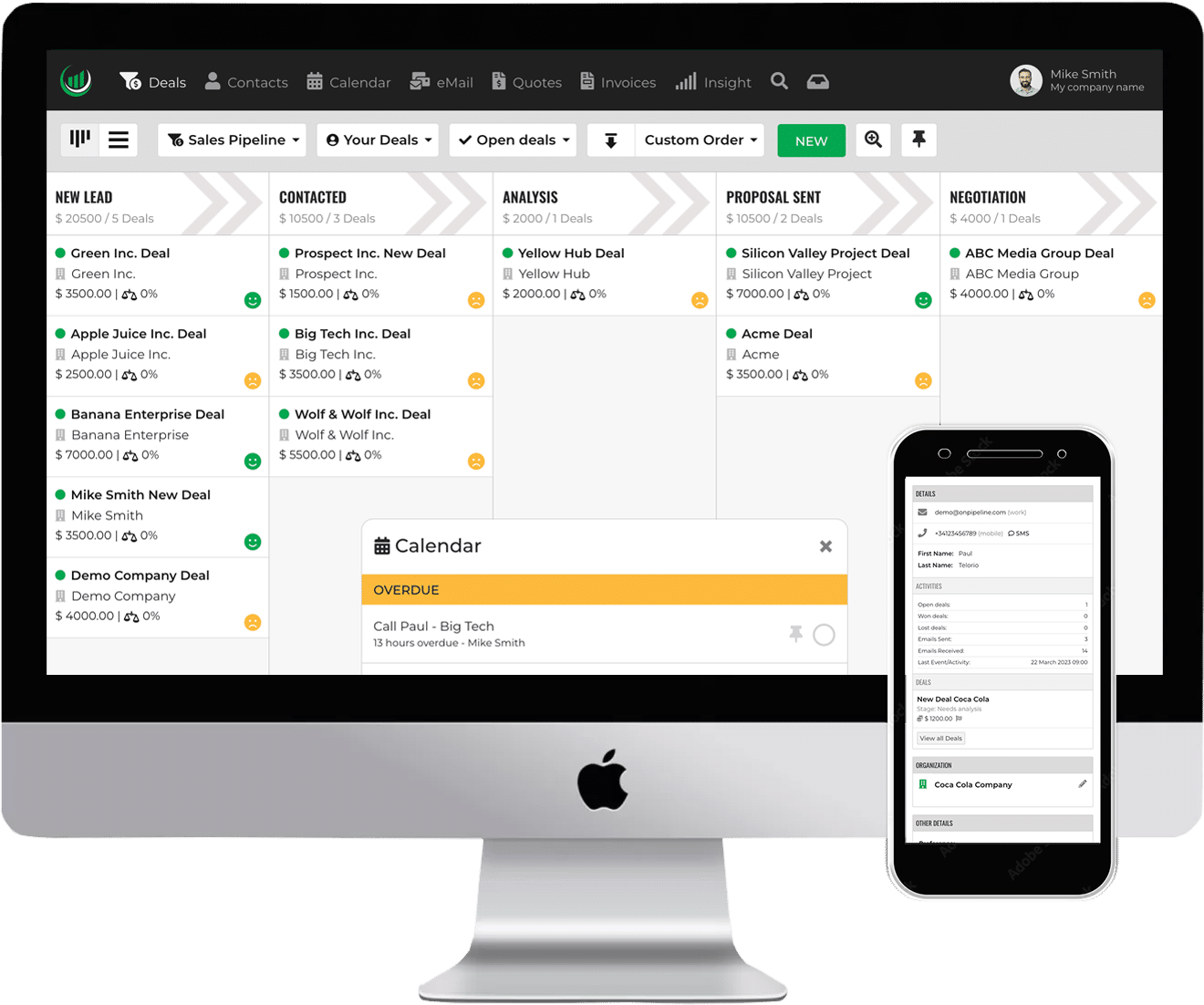Learn how to evaluate the ROI of your CRM and ensure it delivers value to your organization.
Assessing ROI
Evaluating the ROI of your CRM involves examining both quantitative and qualitative factors.
Cost Savings and Efficiency Gains
A well-implemented CRM reduces manual effort and enhances operational efficiency. Calculate how much time and resources your team saves by using the CRM compared to previous methods. This efficiency gain translates into cost savings and allows your team to focus more on revenue-generating activities.
Improved Sales Performance
CRM systems provide insights into customer behavior, sales pipelines, and lead management. Analyze key metrics such as conversion rates, sales cycle length, and average deal size to gauge the impact of CRM on sales performance.
Improved lead nurturing, personalized communications, and better forecasting capabilities contribute to higher sales efficiency and effectiveness.
Enhanced Customer Relationships
Centralizing customer data enables personalized interactions, timely follow-ups, and better customer service. Measure improvements in customer satisfaction scores, retention rates, and repeat business to assess the CRM’s contribution to building stronger customer relationships. Happy customers are more likely to become loyal advocates for your brand.
Strategic Insights & Decision Making
Beyond day-to-day operations, CRMs provide valuable data for strategic decision-making. Utilize reporting and analytics features to identify trends, spot opportunities, and optimize marketing campaigns. Data-driven insights empower management to make informed decisions that drive business growth and competitive advantage.
A Practical Example
Investing in a CRM system can seem like a significant expense. However, the benefits in terms of increased revenue and better customer management often far outweigh the costs. According to studies (WebFX), companies that implement a CRM can see a return of $3.50 for every dollar spent.
$1,000 per Month CRM
At $1,000 per month, you’re getting a comprehensive tool that centralizes all your customer data, making it accessible to your entire team.
This means that every interaction, purchase history, and customer preference is stored in one place, reducing the time spent searching for information and allowing your team to focus on delivering excellent service.
The Revenue Impact:
Now, let’s look at the potential revenue impact. Suppose your business has an average deal size of $5,000 and a sales cycle of one month. Before using a CRM, you might close 10 deals per month, resulting in $50,000 in revenue.
After implementing the CRM, with improved lead management and personalized marketing, you increase your close rate by 30%, resulting in 13 deals per month. This means an additional $15,000 in revenue per month. So, while you’re spending $1,000 per month on the CRM, you’re gaining an extra $15,000 in revenue.
More importantly, the CRM allows your business to scale effectively and keep things under control, providing significant long-term value. See below.
Enhanced Sales Pipeline Management
A CRM offers robust sales pipeline management, allowing you to track and manage potential sales opportunities more effectively. By having a clear view of where each lead is in the sales process, your sales team can prioritize their efforts, follow up on leads in a timely manner, and close more deals. This streamlined process can significantly increase your conversion rates and overall sales.
Automated Marketing Campaigns
With CRM, you can automate your marketing campaigns and target customers with personalized messages based on their behavior and preferences.
This level of personalization can lead to higher engagement rates and more successful campaigns. For example, if a customer shows interest in a particular product, you can automatically send them tailored content or offers related to that product, increasing the likelihood of a purchase.
Improved Customer Interactions
A CRM enhances your customer support by providing a complete view of each customer’s history with your company. This allows your support team to address issues more efficiently and offer personalized assistance. Happy customers are more likely to remain loyal and recommend your business to others, which can lead to increased revenue through repeat business and referrals.
Analytics and Reporting
One of the most valuable aspects of a CRM system is its ability to provide detailed analytics and reporting. These insights allow you to understand your sales performance and customer behavior better. By analyzing this data, you can identify trends, optimize your sales strategies, and make informed business decisions. For instance, if you notice a particular product is performing well, you can allocate more resources to promote it further.
Maximizing CRM ROI
To maximize the ROI of your CRM investment, consider these strategies:
Set Clear Objectives: Define specific goals and KPIs that align with your business objectives. Whether it’s increasing sales revenue, improving customer satisfaction, or streamlining processes, clarity in objectives helps measure success and justify the investment.
Train and Empower Users: Invest in sales training programs to ensure your team understands how to effectively use the CRM. Foster adoption by demonstrating the benefits and providing ongoing support. User engagement and proficiency are key factors in realizing the full potential of your CRM investment.
Continuous Improvement: Regularly review CRM performance and gather feedback from users to identify areas for enhancement. Stay informed about updates and new features offered by your CRM provider to leverage advancements in technology and functionality.
Integrate and Customize: Integrate your CRM with other systems and tools to enhance its functionality and usability. Customize workflows and configurations to fit your unique business processes and requirements. A tailored CRM solution maximizes efficiency and user satisfaction across departments.
Takeaway
In conclusion, evaluating the ROI of your CRM investment involves assessing its impact on cost savings, sales performance, customer relationships, and strategic decision-making. By measuring tangible benefits and optimizing utilization, businesses can ensure that their CRM investment delivers measurable value and contributes to long-term success.
Remember, the true worth of a CRM lies not just in its features, but in its ability to drive operational excellence and customer-centric growth




